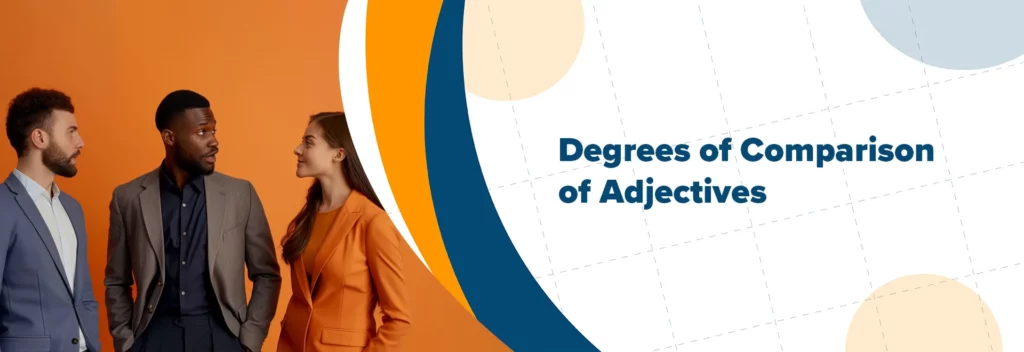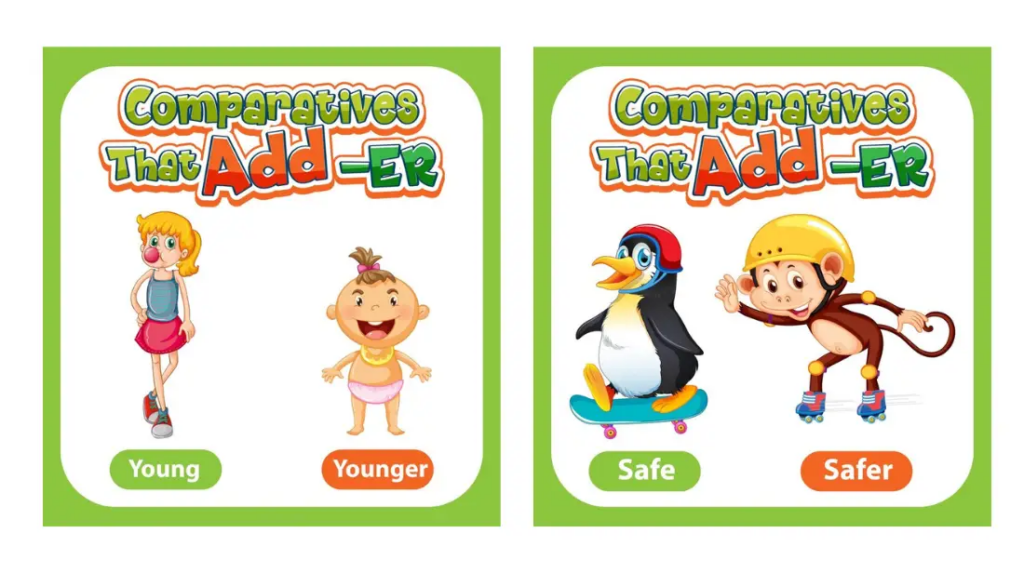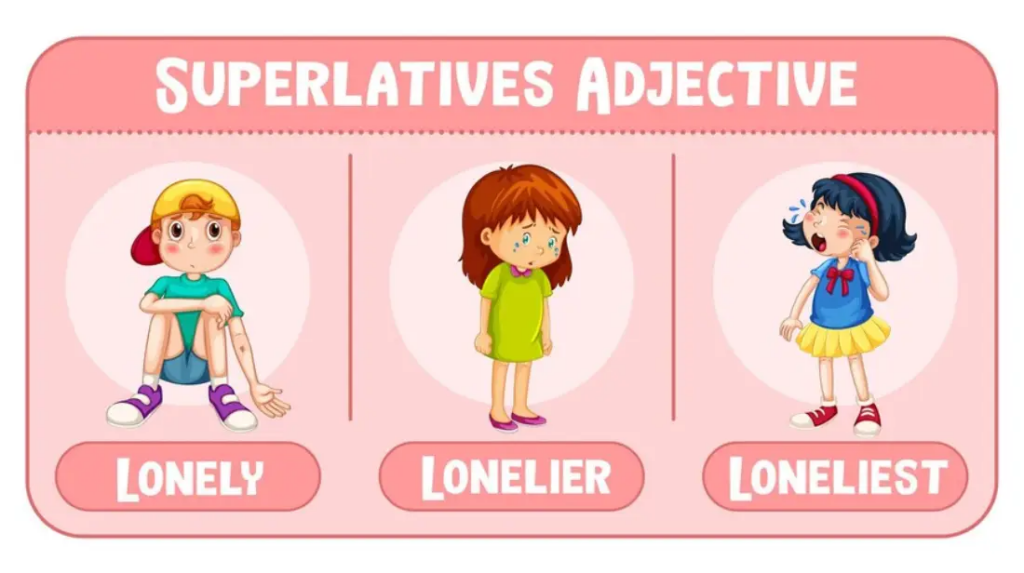
Degrees of Comparison of Adjectives

An adjective is a part of speech that is used to describe a noun or a pronoun. It is also used to quantify, qualify, and modify the noun or pronoun in sentences. It adds more meaning to the sentence. Adjectives have many features that are essential in learning the English grammar. For language learners, it is important to know more about adjectives and their functions in sentences because they are commonly used in conversations. As part of learning, a learner needs to be aware of these aspects particularly the degrees of comparison of adjectives.
“Degrees of Comparison of Adjectives” Explained
In English, the degrees of comparison of adjectives are essential grammar points that are used to compare two or more things.
There are three degrees of comparison of adjectives: Positive, Comparative, and Superlative. These degrees are generally formed from adjectives according to their level. We apply particular grammatical rules in forming the degrees of comparison of adjectives to identify their level in sentences.
We will take a closer look at these degrees of comparison of adjectives to understand them better.
Positive Degree
The positive degree is the simplest form of the three degrees of comparison of adjectives. Initially, we are not really comparing things here. This is the main adjective or the root word that we base our comparison with other things.
Examples of verbs in the Positive Degree:
- Beautiful – The lady is beautiful.
- Happy – I want to be happy.
- Nice – The weather was nice.
- Hungry – Do you feel hungry at the moment?
- Elegant – The candidate looked stunning in her elegant evening gown.
- Cheap – Her new phone is cheap.
- Thin – There is a thin piece of paper on the table.
You can also use the expression “as…as” to also signify that the adjective is in the positive degree.
Examples:
- My mother is as tall as her sister.
- The wall is as high as the door.
- This scent smells as fragrant as the one you have.
Comparative Degree
The comparative degree is one of the degrees of comparison of adjectives that compares two things, people, events, animals, and places. In particular, it used to compare specifically two nouns or pronouns.
We usually add “-er” and “-r” to the end of the root word or “more” at the beginning of the one-syllable adjective. The word “than” is the most important word in the comparative degrees of comparison of adjectives.
Examples:
- My father is taller than my brother.
- I think Paris is more beautiful than New Delhi.
- The new watch I bought is cheaper than my smartphone.
- This book is thinner than that book.
- The table in my office is heavier than the one at the café.
Superlative Degree
The superlative degree is the highest form of the degrees of comparison of adjectives because it describes “the most” among three or more nouns or pronouns.
We add the suffix “-est” to the end of the root word or the word “most” before it. Don’t forget to include the definite article “the” before the adjective.
Examples:
- Alexie is the brightest student in her class.
- Mount Fuji is the highest mountain in Japan.
- Did you choose the thickest fabric for your uniform?
- Philippines wore the shiniest pair of earrings during the competition.
- The most expensive thing I’m wearing is my necklace.


What are Irregular Adjectives?
Just like verbs, adjectives also have irregular forms. Irregular adjectives are adjectives that are formed differently in both comparative and superlative degrees. These adjectives are fixed in form and spelling. They do not add “-er”, “-r”, and “more” in their comparative form, or “-est” and “most” in their superlative form.
Below are examples of irregular adjectives that we commonly see in texts or use in our conversations.
Positive | Comparative | Superlative |
Good | Better than | The best |
Bad | Worse than | The Worst |
Many | More than | The most |
Far | Further than | The furthest |
Rules in Forming the Comparative and Superlative Degrees of Adjectives
- Add “-er” or “-est” to one-syllable adjectives ending in consonant.
Great – greater than – the greatest
High – higher than – the highest
Dark – darker than – the darkest
Strong – stronger than – the strongest
- For a one-syllable adjective ending in a single vowel and a single consonant respectively, double the last letter and add “-er” or “-est.”
Thin – thinner than – the thinnest
Big – bigger than – the biggest
Fat – fatter than – the fattest
◙ “Fun” is an exception.
- For one-syllable adjectives ending in “-e”, just add “-r” or “-st.”
Nice – nicer than – the nicest
Large – larger than – the largest
Wide – wider than – the widest
Wise – wiser than – the wisest
◙ “Huge” is an exception.
- Two-syllable regular adjectives that end in “y” is formed by omitting the “y” and changing to “i” then added with “-er” and “-est.”
Heavy – heavier than – the heaviest
Happy – happier than – the happiest
Funny – funnier than – the funniest
Merry – merrier – the merriest
Busy – busier than – the busiest
- Add “more” at the beginning of the root word and “than” after it to form adjectives with two or more syllables into comparative degree. Add “the most” at the beginning for superlative degree.
Awesome – more awesome than – the most awesome
Thoughtful – more thoughtful than – the most thoughtful
Pleasant – more pleasant than – the most pleasant
Narrow – narrower than – the narrowest
Peaceful – more peaceful than – the most peaceful
Familiarize these rules of forming the degrees of comparison of adjectives. Use them in your sentences more often.
Other uses and rules of comparison
- Adjectives in the comparative and superlative form are placed before a noun or after a be-verb or other linking verbs.
After the be-verb: She is more determined to win than her competitors.
Before the noun: Her coach wanted to see a more determined athlete now than she was before.
Other linking verbs: The price of commodities has become more increasing than the previous years.
- Comparative adjectives usually use words and phrases such as much, a lot, far, a bit/little, slightly, etc. to compare two nouns or pronouns.
You’d feel a lot better if you took some medicine.
Some cars manufactured in Asia are a bit cheaper compared to those in Europe.
If the item is slightly damaged, return it to the seller.
I’m a little tired; let me take a nap.
- Two comparatives can be contrasted by placing “the” before them, indicating that a change in one quality is linked to a change in another.
The longer you wait in line, the more tired you become.
The more stressful work you have, the higher possibility of illness you can have.
The worse attitude you show me, the more irritated I feel for you.
- Two comparatives can also be linked with “and” to show a continuing increase in a particular quality.
I felt seasick because the sea became rougher and rougher.
Why is the dust getting thicker and thicker outside the house?
Long rides in motorbikes make me more and more exhausted.

Things to note about the degrees of comparison of adjectives
- Only descriptive adjectives can be changed in form from comparative to superlative degrees.
- Irregular adjectives do not follow the rules of forming the comparative and superlative degrees of adjectives.
- Irregular adjectives have fixed forms for both comparative and superlative degrees.
- Participial adjectives are considered descriptive adjectives and follow the usual rules in forming the comparative and superlative degrees.
Participial Adjectives
Participial adjectives are words that you think firstly as verbs because they end in “-ed”, “-d”, or “-ing” but they are actually not. These words are participles of adjectives and their function is to modify or describe the noun in the sentence.
Examples:
The show was amazing. All the audience were amazed.
I am interested in painting because it is interesting.
The groom was mesmerized with his wife’s mesmerizing look during their wedding.
Some customers were disgusted with the disgusting situation at the sidewalk cafeteria.
What an inspiring story you have. I’m sure many viewers are inspired.
- Some compound adjectives add -er/-est, or by an irregular form to the first element and would normally form a comparative or superlative in one word.
Long-lasting longer-lasting longest-lasting
good-looking better-looking best-looking
- The opposite of the degrees of comparison of adjectives is also common in adjectives using more, less, much, and few in comparative and superlative.
more patient – less patient
less polite – more polite
more than – fewer than
Conclusion
You now have the idea of the rules of forming the degrees of comparison of adjectives. Keep learning them and practice more often, especially in your English conversations. Sometimes you don’t notice them, but when you do, you can say that it’s better to know a lot about it than not at all.
Test Yourself!
Create your own sentences using the given adjectives in their positive, comparative, and superlative forms.
- Gentle
- Amused – amusing
- Strict
- More envious
- Less careful
- Adorable
- Friendly
- The most glamorous
- The most horrible
- Advantageous
Good luck!




